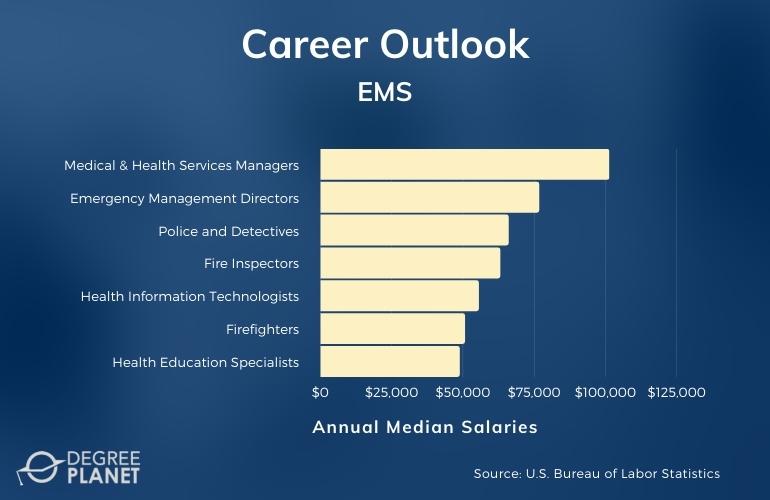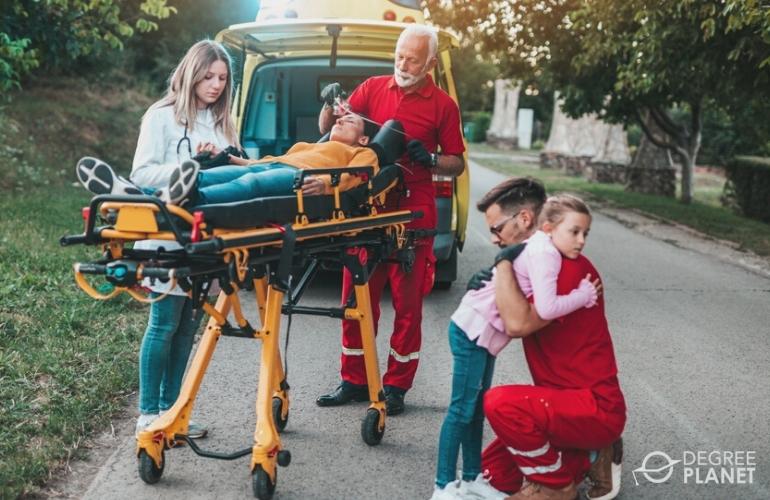An online emergency medical services degree can help prepare you for administrative and leadership roles in EMS organizations.

Emergency medical services (EMS) professionals provide lifesaving care for patients in pre-hospital settings. An EMS bachelor’s degree can help you develop the advanced medical expertise needed to treat patients in distress compassionately and effectively. This degree may also prepare you for more senior positions in the field by allowing you to study topics like disaster preparedness, finance, and healthcare ethics.
Editorial Listing ShortCode:
If you want to pursue a meaningful career in emergency medicine, an online bachelors in emergency medical services can be a strategic degree path.
Online Emergency Medical Services Degrees

An online emergency medical services degree combines hands-on medical training with theoretical knowledge.
You can gain the knowledge and skills needed to treat patients in emergencies, such as people who have been injured in car accidents or suffered from a stroke. You can also study approaches and theories from a range of fields, such as communications, ethics, and finance.
Editorial Listing ShortCode:
EMS professionals provide many essential services to ensure patients receive quality treatment before, during, and after transportation to a medical facility. Individuals in more senior positions may also have administrative, human resources, and management duties.
For example, an EMS professional’s responsibilities may include:
- Creating a budget
- Educating communities about topics like bike safety, fire prevention, and disaster prep
- Extinguishing fires
- Giving aid during natural disasters
- Hiring, firing, and training other EMS workers
- Providing acute medical treatment to patients
- Responding to emergency calls
- Scheduling staff
- Transporting patients to medical facilities by ambulance, helicopter, or another vehicle
An emergency medicine degree can help prepare you to tackle these duties and other challenging tasks. You can learn about many fascinating subjects, such as:
- Communication
- Disaster preparation
- Emergency medical evaluations
- First aid and CPR
- Laws and regulations
- Medical ethics
- Medical terminology
- Pathophysiology
- Pediatric emergency care
- Pharmacology
- Pre-hospital trauma treatment
- Public health emergencies
The broad knowledge and specialized skills you could gain during your online EMS program could help qualify you for employment in many industries and organizations. Employers who frequently hire EMS degree holders include:
- Emergency rooms
- Fire departments
- Hospitals
- Government agencies
- Nonprofit organizations
- Private or public ambulance services
- Public health agencies
An EMS major can also pursue a number of career paths, such as:
- Advanced emergency medical technician
- Ambulance driver
- Emergency management director
- Emergency medical services supervisor
- Field training officer
- Firefighter
- Hospital administrator
- Medical assistant
- Paramedic
This flexible degree can help you launch a career in emergency services. An emergency medical services bachelors degree can also give you foundational knowledge that can help you pursue additional medical training. For instance, some graduates may enroll in graduate school to become a registered nurse or physician’s assistant.
EMS Careers & Salaries

A bachelor’s degree in emergency medical services can help you qualify for a range of career paths in healthcare. The business and management skills you can gain during your studies are also applicable for roles in many other industries.
EMS degree holders may obtain employment in these types of areas, among others:
- Community health services
- Consulting
- Education
- Emergency dispatch services
- Government
- Law enforcement
- Nonprofits
During your studies, you may develop expertise and technical skills in many different topics that might help you obtain better-paying and higher-level positions.
Editorial Listing ShortCode:
According to the Bureau of Labor Statistics, here are some careers related to emergency medical services, along with their median wages.
| Careers | Annual Median Salaries |
| Medical and Health Services Managers | $101,340 |
| Emergency Management Directors | $76,730 |
| Police and Detectives | $66,020 |
| Fire Inspectors | $63,080 |
| Health Information Technologists and Medical Registrars | $55,560 |
| Firefighters | $50,700 |
| Health Education Specialists and Community Health Workers | $48,860 |
| Paramedics | $46,770 |
| Medical Assistants | $37,190 |
| Emergency Medical Technicians (EMTs) | $35,470 |
The Bureau of Labor Statistics projects positive job outlooks for many emergency medical services careers. Firefighters, fire inspectors, EMTs, and paramedics are a few of the jobs anticipated to experience steady growth over the next ten years.
You may boost your opportunities and potential starting salary by choosing an emergency medical services program that offers experiential learning opportunities, internships, and other extracurricular activities. These opportunities could enhance your resume and help you network in your preferred field.
EMS Bachelor’s Curriculum & Courses

Each emergency paramedicine degree offers a unique curriculum based on the program requirements, faculty interests, and other factors. You may come across courses similar to the following:
- Bioethics: This cross-disciplinary class examines contemporary ethical issues and theories related to healthcare, medical research, and pharmaceuticals. Topics may include end-of-life treatment, human cloning, human organ allocation, and research ethics.
- EMS Administration: This course covers common EMS administrative and management duties, such as budgeting, human resources, and organizational planning.
- EMS Law and Legal Issues: You’ll study health laws, legal issues, and regulations, including essential subjects like consent, medical malpractice, and patient confidentiality.
- Environmental Emergencies: You’ll develop advanced expertise in treating patients suffering from heat exhaustion, frostbite, lightning injuries, and other ailments caused by environmental factors.
- Fire Prevention: You’ll learn about the history of fire prevention, strategies to avoid and control fires, and fire safety education.
- Medical Terminology: This course provides a thorough overview of essential medical vocabulary, etymology, and proper pronunciation.
- Pandemics and Public Health Threats: You’ll study the fundamentals of epidemiology, the history of outbreaks, and strategies to promote public health.
- Paramedic Foundations: This introductory class provides an overview of the duties and roles of paramedics and other emergency service workers. Subjects can include accommodating patients’ cultural preferences, advanced airway management, medical communications, and therapeutic communication.
- Patient Assessment: You can learn methods to physically examine, assess, and document patients experiencing medical issues or trauma.
- Pediatric Emergencies: This class covers common pediatric emergencies and teaches strategies to assess, communicate with, and treat infants and children, such as neonatal transport and pediatric resuscitation.
Selecting an online health services degree program that offers courses related to your areas of interest can be strategic. Some programs also offer electives, honors theses, independent studies, and other options that can increase your knowledge and strengthen your resume.
Admissions Requirements

All bachelors in emergency medical services programs have individual application requirements, but you’ll likely be required to submit some or all of these common application materials:
- ACT or SAT scores (only some schools require them)
- Letters of recommendation
- Personal statement describing your career, educational, and personal goals
- Official school transcripts
Some online programs may require you to meet a minimum GPA requirement, such as a 3.0. It may also be necessary to obtain an EMT-paramedic certification or license to qualify for certain programs. Researching each school’s admissions requirements before applying can help you assemble the appropriate materials.
EMS Degrees Accreditation

A number of schools that offer EMS bachelor’s degrees have received regional accreditation. This credential demonstrates that a school meets rigorous quality standards that an external accrediting agency developed.
Receiving your paramedic degree from a regionally accredited school has numerous benefits. For instance, students at accredited institutions can apply to receive certain grants, scholarships, and student loans. Employers often prefer to hire graduates from accredited programs, as this credential proves to other emergency workers that you have received a high-quality education.
Editorial Listing ShortCode:
You can research if a school has received regional accreditation by visiting the Council for Higher Education Accreditation (CHEA) online.
Financial Aid and Scholarships

When it comes to paying for an online degree in emergency medical services, you can apply to financial aid opportunities that may reduce the upfront costs of your studies.
Federal and state governments offer a number of financial aid options for eligible students. You can borrow money to cover educational costs through federal student loans. You may also qualify for federal grants or work-study programs.
Your school may also offer financial aid to qualifying students through grants, scholarships, and tuition waivers. In addition, local community and professional organizations may offer scholarships for students who plan to pursue specific careers in EMS, such as firefighting.
Some employers even provide tuition assistance for employees who want to further their training and education. You can visit the Federal Student Aid website to explore financial aid options and check your eligibility.
What Is an Emergency Medical Services Degree?

An emergency medical services (EMS) degree is a bachelor program that teaches you the foundational skills needed to provide ill and injured patients with acute treatment.
You can learn how to administer quality care in emergencies through coursework, hands-on learning sessions, and internships. This degree can also teach you how to tackle common challenges EMS workers face, such as ethical issues, uncooperative patients, and legal regulations.
You can also develop valuable business, leadership, and risk management skills. This advanced knowledge can help you qualify for more senior positions in the field.
What Can You Do with an Emergency Medical Services Degree?

An emergency medical services degree can help you prepare for many rewarding careers in healthcare and other areas.
Many EMS degree holders provide direct care for patients. For instance, graduates may seek employment as ambulance drivers, emergency room technicians, emergency medical technicians, or paramedics. EMS jobs adjacent to or outside of the medical field include firefighter, law enforcement officer, and EMS education specialist.
A bachelors in emergency medical services can also help prepare students for senior, administrative, or leadership positions in the field. For instance, some EMS professionals become emergency services directors or fire chiefs.
How Long Does It Take to Get an EMS Degree Online?

The time it will take you to complete an EMS degree online depends on several factors, including your enrollment status and the program requirements.
If you enroll full-time in a bachelor’s program that offers traditional 16 week courses, you can generally complete your degree in 4 years. Some online programs offer accelerated 8 week classes. If you enroll in one of these programs continuously, including during the summer, you may be able to complete your degree in less time.
Choosing to take classes on a part-time basis or to take breaks between semesters could extend the time that it takes you to finish your degree.
Is an Online EMS Degree Worth It?

Yes, an online EMS degree is worth it for many students. This major can prepare you for a challenging but rewarding career in emergency medical services.
You could provide timely treatment for patients experiencing serious medical crises and trauma. Your skilled intervention could literally save lives, and compassionate care can make a significant difference for people undergoing stressful and traumatic situations.
Editorial Listing ShortCode:
Demand for EMS professionals is also growing. For instance, the Bureau of Labor Statistics projects 7% job growth for EMTs and paramedics over the next ten years. A bachelors in this field could also help you prepare for more senior or leadership roles in emergency medical services.
Universities Offering Online Bachelors in Emergency Medical Services Degree Programs
Methodology: The following school list is in alphabetical order. To be included, a college or university must be regionally accredited and offer degree programs online or in a hybrid format.

Anderson University offers a BA in Homeland Security and Emergency Services with a concentration in Emergency Service Management that can be completed entirely online. To graduate, students must complete 120 credit hours. The curriculum consists of courses such as Incident Management and Planning for Emergencies and Social Dimensions of a Disaster.
Anderson University is accredited by the Commission on Colleges of the Southern Association of Colleges and Schools.

Eastern Kentucky University offers a BS in Emergency Medical Care with a specialization in Emergency Services Administration. The program is fully online. To graduate, students must complete 120 credit hours. There are six start dates offered throughout the year. All courses are offered in an 8 week, accelerated format. Students may transfer in up to 90 qualifying credits from another institution.
Eastern Kentucky University is accredited by the Southern Association of Colleges and Schools Commission on Colleges.

Franklin Pierce University offers both a BA and a BS in Emergency Medical Services, Management Track. Both degrees can be completed fully online. Students with EMT licensure may be able to transfer in up to 40 credits. Students may also be able to get credit for work experience. The curriculum consists of courses such as Risk Management Practices.
Franklin Pierce University is accredited by the New England Commission of Higher Education.

George Washington University offers a BS in Health Sciences with a specialization in Emergency Medical Services Management. The program is offered entirely online. Students must complete 120 credit hours to graduate. They may transfer in up to 60 qualifying credit hours in core requirements from other institutions. They may also be able to earn credits for other training.
George Washington University is accredited by the Middle States Commission on Higher Education.

Idaho State University offers a BS in Health Sciences with a concentration in Emergency Medical Services. Students in the program may choose the Leadership and Management track. The program is offered mostly online, but some courses have on-campus components. To graduate, students must complete a total of 120 credit hours, including credits in their chosen track.
Idaho State University is accredited by the Northwest Commission on Colleges and Universities.

Point Park University offers a BS in Public Administration with a concentration in Emergency Medical Services. The program is offered entirely online. To graduate, students must complete 120 credit hours, which can typically be done in 2 to 4 years. Classes are offered in an accelerated, 8 week format.
Point Park University is accredited by the Middle States Commission on Higher Education.

Thomas Jefferson University offers a BS in Leadership in Emergency Services. The program is offered partially online with some hybrid courses included. On-campus components are planned with working students in mind. To graduate, students must complete 120 credit hours. Classes are offered in an 8 week, accelerated format. Graduates of the program often go on to earn an MS in Disaster Medicine and Management.
Thomas Jefferson University is accredited by the Middle States Association of Colleges and Schools.

U.S. News & World Report named the University of Arizona number seven for best online bachelor’s programs. The school offers a BS in Emergency Medical Services through its online program. All courses are fully online. To graduate, students must complete 120 credit hours. Applicants must also hold a valid paramedic license to qualify.
The University of Arizona is accredited by the Higher Learning Commission.

The University of North Texas—Dallas offers a BAAS with a concentration in Emergency Services Administration. The program is offered fully online and is nationally recognized through the US Fire Administration. Students in the program are required to complete 120 credit hours. Graduates may go on to become fire chiefs and fire marshals.
The University of North Texas at Dallas is accredited by the Southern Association of Colleges and Schools Commission on Colleges.

Weber State University offers a BS in Emergency Healthcare Sciences. Many courses focus on Healthcare Administration Services. The program is offered entirely online to help working students. No students have to pay out-of-state tuition fees. To graduate, they must complete 128 to 131 credit hours. WSU accepts qualifying transfer credits from accredited institutions.
Weber State University is accredited by the Northwest Commission on Colleges and Universities.
Getting Your Bachelor Degree in Emergency Medical Services Online

An online bachelor’s in emergency medical services degree can help you develop expertise in many topics, including communication, disaster preparation, and leadership. You can learn essential skills related to providing pre-hospital care and managing emergency systems.
This degree can open the door to many satisfying career paths related to emergency medical services. Many go on to become emergency management directors, firefighters, or paramedics. You might help people experiencing medical emergencies receive appropriate and fast treatment. You may also seek employment in other administrative and management positions.
If you’re ready to pursue your EMS degree, you can start your educational journey today by exploring accredited universities.

